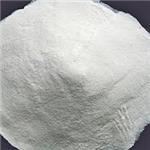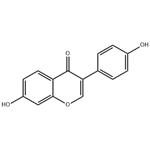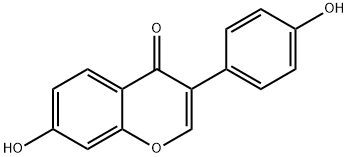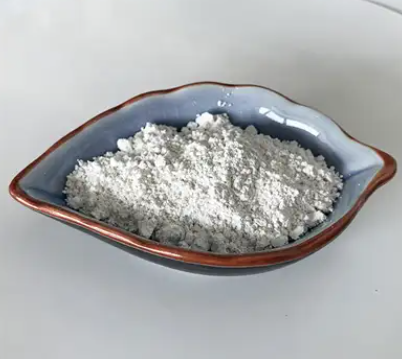What are the sources of Daidzein?
Introduction
Daidzein (DDZ), an isoflavone found in soybeans, stimulates collagen synthesis by fibroblasts and shows a chemically similar structure to estradiol, a female hormone. Daidzein [7-hydroxy-3-(4-hydroxyphenyl)-4H-1-benzopyran-4-one] is a naturally occurring phytoestrogen fitting into the category of nonsteroidal estrogens, with numerous pharmacological activities, such as antihemolytic, antioxidant, and anti-inflammatory activities[1].
Sources of DDZ
Red clover (Trifolium pratense), soybean (Glycine max), lucerne (Medicago sativa), kudzu (Pueraria radix), and red lentils (Lens esculenta) and other legumes (Leguminosae) are among the plants that contain DDZ primarily in the form of glucosides. The most plentiful sources of DDZ among them are thought to be soybeans and products made from soybeans. The amount of total isoflavones in soybeans varies based on the variety of soybeans, the geographical distribution, and the harvesting year. Owing to fermentation’s active increase in the concentration of aglycones, the quantity range of DDZ in the soured soybean type is larger than that in nonfermented soybeans[2].

It has been shown that several microorganisms, including Bacillus species, Rhizopus species, and Aspergillus species, participate in the fermentation process by glycosylating isoflavone. Another well-known traditional Chinese medicine frequently taken as a dietary supplement is kudzu root (Pueraria radix), which has been found to contain DDZ in its glycoside and aglycone forms. Various plant species have varied amounts of Daidzein, expressed in milligrams per kilogram of dry weight. The amount of Daidzein in Glycine max, also called soybeans, is relatively high at 37.6 mg/kg. Garden peas, or Pisum sativum, have 0.4 mg/kg daidzein, which is a lesser concentration. Common beans, or Phaseolus vulgaris, have a moderate 23.2 mg/kg daidzein concentration. Lima beans (Phaseolus lunatus) and mung beans (Vigna radiata) have a lower daidzein concentration of 0.3 mg/kg. Adzuki beans, or Vigna angulariz, and fava beans, or Vicia faba, contain 4.6 and 5.0 mg/kg daidzein, respectively.
Used in food
Daidzein can be found in soy-derived food products such as soy-based infant formulas, soy flour, textured soy protein, soy protein isolates, tofu, tempeh, and miso. In addition, soy flour is used to fortify other flours, including wheat, rice, and corn. The daidzein content of these products is quite variable, i.e., the daidzein amount is 22 mg in a half cup of miso, 15 mg in 3 ounces of tempeh, 8 mg in 3 ounces of tofu, and 7 mg in one cup of soy milk.
Benefits
Daidzein (7,4′-dihydroxyisoflavone), a natural isoflavone with estrogen-like activity, exists widely in soybeans and has various properties, such as anticancer, neuron protection, and antiinflammation activities. Previous studies reported that Daidzein inhibits the bone resorption activity of osteoclasts and stimulates osteoblast differentiation. Furthermore, synthesized daidzein analogues exhibited antiestrogenic and antitumorigenic activities in breast cancer cells. Strong et al. demonstrated that daidzein analogs enhanced ALP activity, calcium deposition, and phosphate mineralization. Moreover, daidzein analogs increased the expression of key osteogenic genes, such as RUNX2, COL1α1, and sclerostin. Furthermore, Hu et al. demonstrated that Daidzein promotes the differentiation of osteoblastic OCT1 cells via the BMP2/Smad pathway. Daidzein ameliorates LPS-induced hepatocyte injury via Nrf2 activation; however, no studies have shown that Daidzein has antiosteoporotic activity via the Nrf2/Keap1 system.
References:
[1] MOHAMMED UBAID, MOHD. AAMIR MIRZA*. Daidzein from Dietary Supplement to a Drug Candidate: An Evaluation of Potential[J]. ACS Omega, 2023, 8 36: 32222-33097. DOI:10.1021/acsomega.3c03741.[2] MOHAMMED M ALSHEHRI. Therapeutic Potential of Isoflavones with an Emphasis on Daidzein.[J]. Oxidative Medicine and Cellular Longevity, 2021. DOI:10.1155/2021/6331630.
You may like
Related articles And Qustion
See also
Lastest Price from Daidzein manufacturers

US $1200.00-1100.00/ton2025-09-30
- CAS:
- 486-66-8
- Min. Order:
- 1ton
- Purity:
- 99%
- Supply Ability:
- 1000T/M

US $0.00-0.00/kg2025-09-08
- CAS:
- 486-66-8
- Min. Order:
- 1kg
- Purity:
- 98%
- Supply Ability:
- 1



